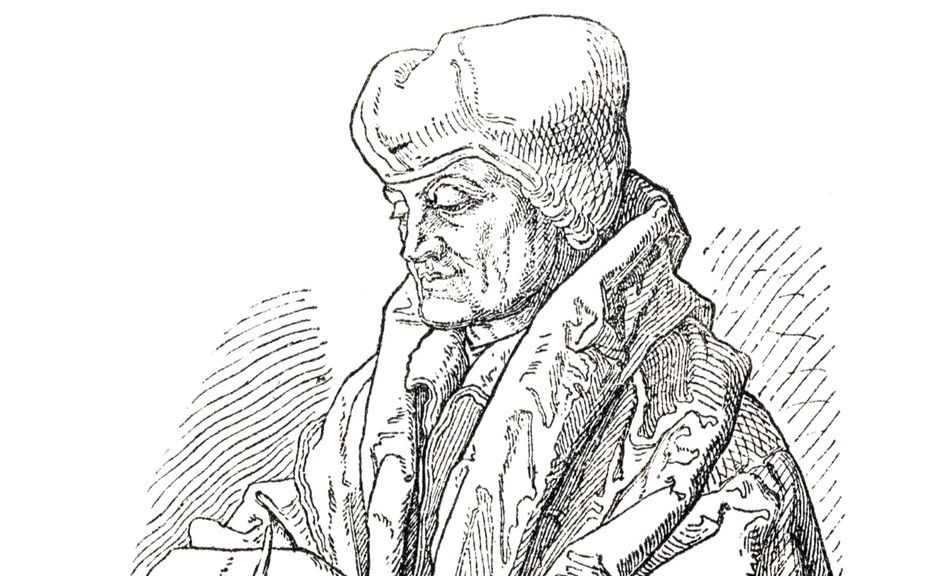Who was the most important figure in the Protestant Reformation? Luther? Calvin? Tyndale? If you could ask those leaders themselves, they might point you to a Dutch scholar named Erasmus, who wasn't even a Protestant. This monk-turned-writer focused his sarcastic gaze on the corrupt excesses of the late Medieval church. He challenged Christians to get back to the first-century faith. He produced new versions of the New Testament in the hopes that everyone would be able to read it. Erasmus never left the Roman Catholic Church, but the Reformation might never have happened without him.
New ideas swirled through Europe in the early 1500s. The intrepid wit of Erasmus paved the way for many, like Luther, to attack church practices. But Luther himself didn't escape the scholar's critique. When monks accused him of "laying the egg that Luther hatched," Erasmus replied that he had expected "quite another kind of bird." A man of moderation, Erasmus, hoping to see change from within, stayed with the church that had nurtured him.
Born Geert Geertsen in Rotterdam, Netherlands, Erasmus studied with a loosely structured group of church scholars known as the Brethren of the Common Life. He joined the Augustinian order and was ordained a priest at age 23. But monastic life didn't suit him, and after three years he left the monastery to study in Paris. Later he traveled extensively through France, Belgium, and England. Erasmus spent profitable time at both Cambridge and Oxford, staying in the home of the Lord Chancellor, Sir Thomas More (the subject of the classic film A Man for All Seasons), who became a great friend. "It was he [More] who pushed me to write The Praise of Folly," Erasmus said of his best-known literary work.
The Praise of Folly comically critiqued various abuses in the world and in the church. It found an enthusiastic audience among those who were similarly concerned about church excesses. Some of these became Reformers; others sought to influence the Church from within. Erasmus made some enemies with his writing, but the satire painted with such a broad brush, and with such clever wit, that the effect was not mean-spirited. Many were led to laugh at themselves.
Eventually settling in Basel, Switzerland, Erasmus continued his scholarship and social commentary. While he advocated the study of ancient pre-Christian writers, he disapproved of those who studied only those classics and ignored Christian traditions. He regularly cited the New Testament in his writings. If only Christians could get back to that level of simplicity, he felt, the church would be better off. Though he read Luther and admired his early works, he could not go along with Luther on doctrinal changes. But Erasmus could be bitterly satirical about the monastic life of his times and longed to see the correction of abuses in church discipline, the removal of popular forms of devotion that bordered on superstition, and a more open approach to intellectual studies. But that was as far as he would go.
An especially sensitive issue was the doctrine of the Eucharist. He wrote; "I agree . . . that it would be simpler to say that Christ is present in the Sacrament and leave the matter to God," but he added, "The Christian, lest he fall into a labyrinth, should not depart from the authority of the councils and the consensus of all the churches throughout the ages."
In Other Words
Another major contribution of this multi-faceted churchman was his translation of the New Testament. The church had been using Jerome's Latin translation, the Vulgate, for a millennium. Though he was quite a fan of Jerome, Erasmus felt there was room for improvement. In the interest of recovering the spirit of the first-century church, he sought the best Greek manuscripts available to produce a state-of-the-art Greek text and then translated this into Latin.
This was typical of the moderation of this thinker. It was still a Latin translation, and so it would be read mostly by scholars and priests, but it was a clear improvement on the creaky Jerome text, stylistically elegant and truer to the original Greek.
The new translation was published in 1516 by printer John Froben, and Erasmus shrewdly dedicated the work to Pope Leo X. The pope's approval appeared in 1518.
Luther loved the new version, as did other Reformers. In it, some found the inspiration to work on other translations into their own languages. And Erasmus' work on the Greek text became the basis of the great textus receptus, used for the King James Bible of 1611.
In the preface to his new version of the Scriptures, Erasmus wrote, Would that these were translated into each and every language so that they might be read and understood not only by Scots and Irishmen but by Turks and Saracens. . . . Would that the farmer might sing snatches of Scripture at his plough and that the weaver might hum phrases of Scripture to the tune of his shuttle, that the traveler might lighten with stories from Scripture the weariness of his journey.
Fame and Flight
In the wake of his new translation, Erasmus became the most celebrated scholar in the world. Emperor Charles V gave him a pension. King Francis I offered him "mountains of gold" if he would come to France. But he mostly stayed in Basel, churning out new editions of the writings of church fathers. Protestants and Catholics alike came calling, and Erasmus maintained his middle ground.
But in early February of 1529, religious conflict erupted in Basel. The city's churches were ransacked and the Catholic members of the council, forced to resign. Erasmus was disappointed but not surprised. Two years earlier he had written, "I notice that a breed of people has emerged which my soul deeply abhors. I do not see anybody becoming better. . . . There is no moderation, no genuine goodness." Erasmus had looked for something else from the Reformation: a purification of the church, but of the church he had always known. "Death will not part me from it," he vowed, "unless the Church openly departs from Christ." Although not willing to take an active part, Erasmus was no enemy of the Reformation and always opposed violent punishment of heretics and cruelty in any form. Still, he fled to Germany for a time.
Erasmus and Luther
Martin Luther and Erasmus were two significant pillars of the Reformation and among the most important men in Europe in the early 1500s. They shared many concerns about the Church but differed on numerous issues as well. Though they never met, their correspondence with others shows they held strong opinions about each other.
Erasmus on Luther: Luther is so great that I shall not write against him. . . . I have taught well nigh all that Luther teaches, only less violently, without so many enigmas and paradoxes . . . . I hope that all the tumult Luther has stirred up will, like a drastic medicine, somehow bring about the health of the Church.
Luther wasn't quite as complimentary in return. He was disappointed in what he saw as Erasmus' stopping short of full, needed reform. Luther wrote to fellow reformer Ulrich Zwingli, "[Erasmus] might have been of great service to the evangel, often he was exhorted to this end--he is the worst foe of Christ that has arisen in the last thousand years."
In the following years severe rheumatism and general ill health placed an extra strain on Erasmus as well as the death of his friend and publisher John Froben. Always a moderate, he still had no desire to get involved in the religious upheaval of the times. Taking the papal throne in 1534, Paul III was eager to enlist the assistance of Erasmus for a Council he was planning to summon (Trent), but Erasmus no longer had the strength for such a task. He wrote to Cardinal Cajetan, "What I place above all things is that which leads to the peace of the Church, rather than to my own honor."
Erasmus died at Basel around midnight of July 11th or 12th, 1536. Reportedly, his last words were in Dutch: "Lieuer Gott" [Dear God].
This author-translator was called by Luther scholar Roland Bainton "the fusion of the Christian man and the cultivated man." The world loved him, but he was not taken in by it. "I desire nothing," Erasmus wrote, "except to secure leisure to live wholly to one God, to repent of the sins of my indiscreet youth, to pore over the Holy Scriptures, either to read or write something."
Erasmus was buried in the Cathedral of Basel, and his tomb is now visited by tourists. Today he is hailed more by Protestants than by his fellow Catholics, often considered the intellectual father of the Reformation. Some of Erasmus' works were on the Church's Index of Prohibited Books for many years. The Index was abolished in 1966, one of the changes brought about by Vatican II, a decision which would have earned Erasmus' enthusiastic approval.
The Praise of Folly
Erasmus made a huge splash with the 1509 publication of The Praise of Folly. Bold and biblical, this book satirized the world of that day. Erasmus presented it as an oration by Folly herself, praising the various humans that advanced the cause of foolishness on earth. But no one, you might say, ever made a sacrifice to Folly or built me a Temple. . . .Yet why would I need incense, wafers, a goat, or a sow when all people offer me worship everywhere. . . . They embrace me in their minds, express me in their manners, and represent me in their lives.
This work exposed the vanity of every facet of life, from art and philosophy to the church itself. Erasmus mocked the scholars who determined that "it's a lesser crime to kill a thousand men than to set a stitch on a poor man's shoe on the Sabbath day," adding that "these most subtle subtleties are rendered even more subtle by the various methods of so many Schoolmen, that one might sooner wind his way out of a labyrinth than out of their entanglements."
Erasmus didn't even let bishops and popes off the hook, but sarcastically called them back to the example of Christ. To work miracles, he wrote, is old and antiquated, and not in fashion now; to instruct the people, troublesome; to interpret the Scripture, pedantic; to pray, a sign that one has little else to do; to shed tears, silly and womanish; to be poor, base; to be vanquished, dishonorable and unbecoming to one who scarcely allows even kings to kiss his slipper; and lastly, to die, uncouth; and to be stretched on a cross, infamous.
(Article first published on April 28, 2010)
Photo Credit: Getty Images/Thomas Faull
This article is part of our People of Christianity catalog that features the stories, meaning, and significance of well-known people from the Bible and history. Here are some of the most popular articles for knowing important figures in Christianity:
How Did the Apostle Paul Die?
Who are the Nicolaitans in Revelation?
Who Was Deborah in the Bible?
Who Was Moses in the Bible?
King Solomon's Story in the Bible
Who Was Lot's Wife in the Bible?
Who Was Jezebel in the Bible?
Who Was the Prodigal Son?








